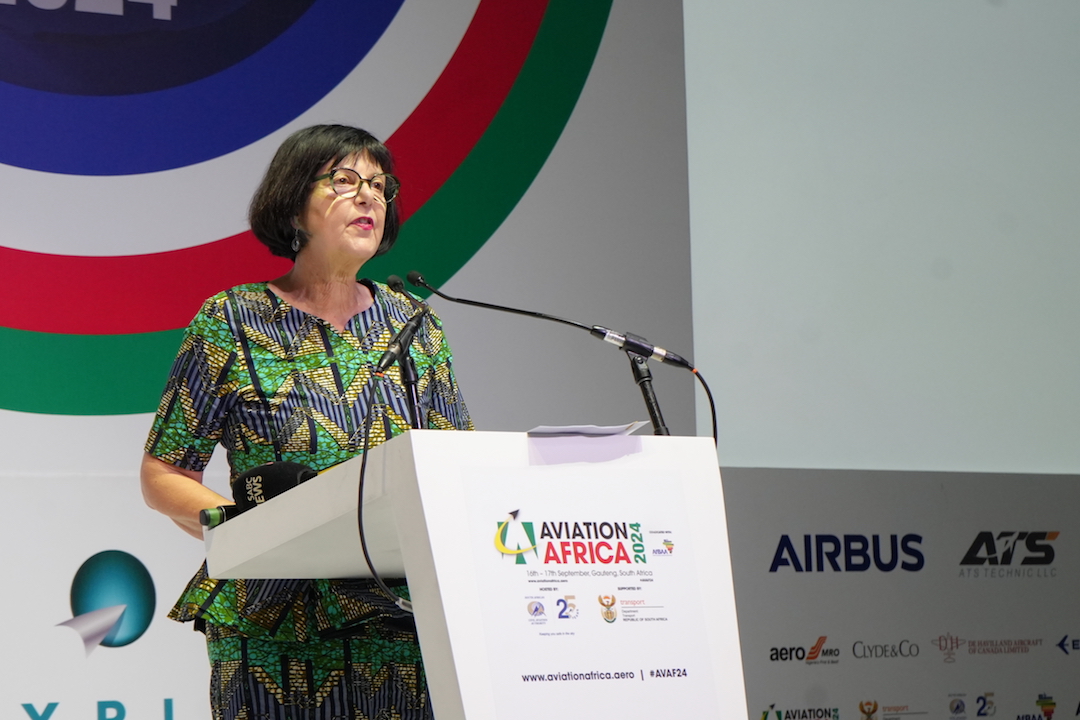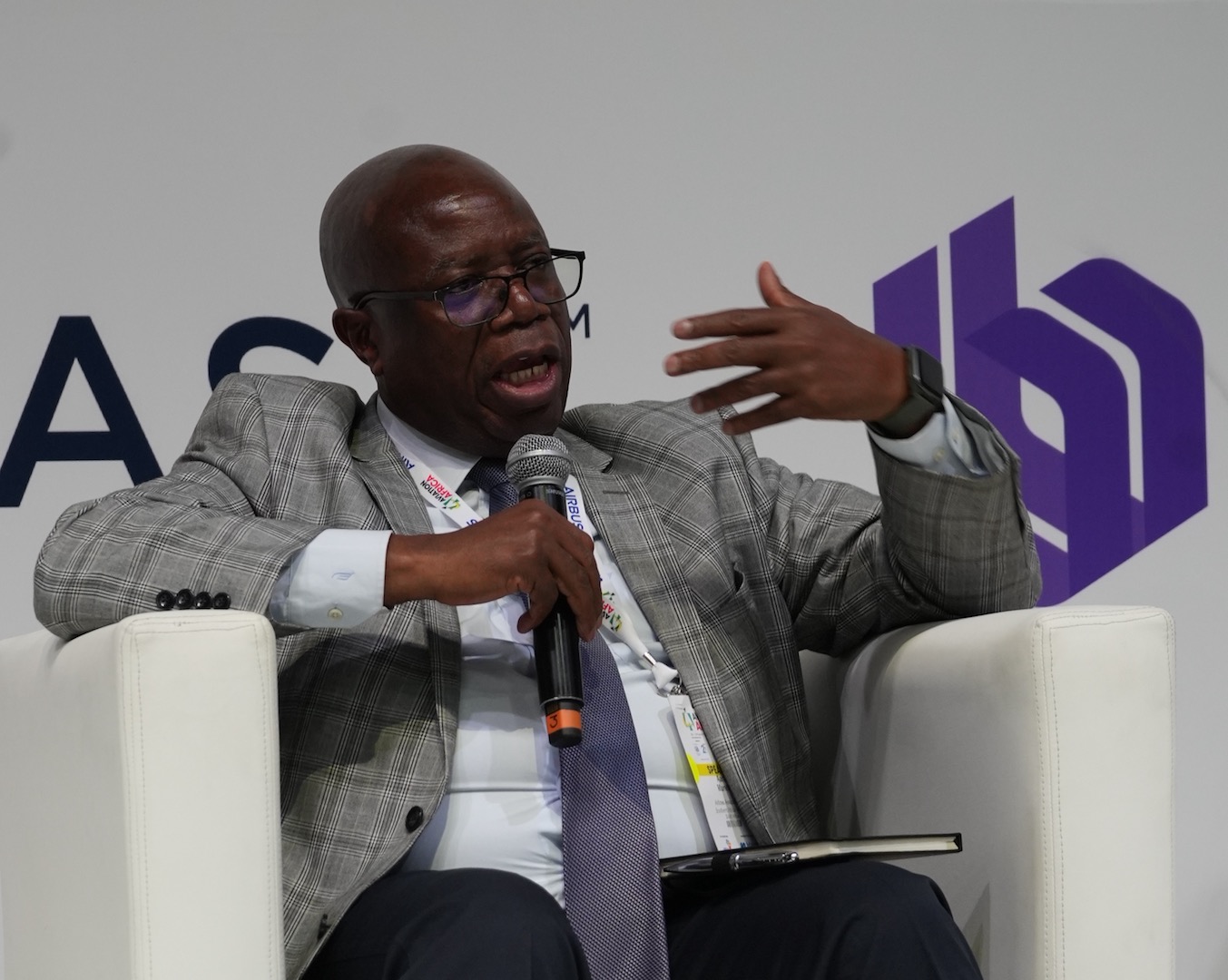Time for the doubters to change their tune
Africa’s commercial air transport leaders gathered in Johannesburg in mid-September at the eighth Aviation Africa Summit and Exhibition, organised by Times Aerospace Events and sponsored by the South African Civil Aviation Authority.

The Domba African choir, one of Johannesburg’s leading choral groups, welcomed delegates to their seats as Aviation Africa Summit 2024 kicked off. IMAGE: Aviation Africa 2024
Barbara Creecy’s first formal public engagement in her new role as South Africa’s Minister of Transport was to open the eighth Aviation Africa Summit and Exhibition, held at the Sandton Convention Centre in the heart of bustling Johannesburg.
Speaking to a room packed with 1,200 delegates, she addressed the Summit’s central theme of ‘Bridging Skies and Leveraging Growth’.
“I believe that I am speaking to the right people when I say that by strengthening co-operation among African nations and the world, we can enhance our collective air transport network, improve connectivity, and support regional trade and tourism.”
With participation from 34 African countries, 92 airlines and operators and more than 100 sponsors and exhibitors, the annual Aviation Africa Summit, which was organised by Times Aerospace Events and co-sponsored by the South African Civil Aviation Authority (SACAA), has grown into the continent’s premier pan-African gathering of its kind.
Times Aerospace also teamed up with the African Business Aviation Association (AFBAA) in Johannesburg, as well as working closely with numerous African and global industry associations. AfBAA held its annual meeting during the Summit.

Creecy eloquently summed up the importance of aviation to Africa. “A strong aviation network is essential for boosting tourism in Africa – aviation is a catalyst for economic growth and cultural exchange. None of it would be possible without this industry,” she said.
However, as summit chair Alan Peaford observed in his opening comments, there are numerous challenges for the industry to deliver today and to unlock the undoubted growth potential of Africa.
As the sessions across the two days highlighted, each link in the value chain from airlines, regulators, airports, air traffic management, MRO and training to finance have their issues, be they capacity, investment, human resources or governance.
Many discussions started by stressing the strong potential of African aviation, but soon moved to highlight the many obstacles to achieving it.
“Africa represents the last frontier for aviation development, but some impotent government transport strategies and ongoing protectionism practices continue to limit its success,” stated Peaford.
Building on Peaford’s themes, Kamil Al-Awadhi, IATA’s regional vice-president for Africa and the Middle East pointed out how African airlines face institutionally higher costs than those in other continents.
“If we look at the cost to operate in Africa it is not cheap. Fuel is roughly 12-18 per cent more expensive than anywhere else in the world. The taxes, charges and fees are also very expensive, which doesn’t encourage the growth of the industry,” said Al-Awadhi.
In his view, the solutions and people with experience to deliver a more successful industry are to hand in Africa, if there is the will to take them.
“We can do it ourselves if we work in a collaborative manner,” said Al-Awadhi. However, “there is going to be a point of no return where you will not be able to fix it because other airlines from outside the continent can simply walk in and take over the business.”
In his address John Lamola, interim CEO of South African Airways, described this group as the “notorious Middle East” carriers, referring particularly to Emirates and Qatar Airways, which have been, along with Turkish Airlines, expanding their networks aggressively into the fast-growing African market.
It is hardly surprising these carriers focus strongly on Africa, with its high growth potential and the inability of mostly weaker African carriers to fight back. They are also investing heavily in some markets. The 25 per cent stake Qatar Airways took in South African regional carriers Airlink in September is a good example and its 49 per cent stake in RwandAir is thought to be close to being finalised.
Good news for all is the rate at which traffic is returning, with IATA’s Al-Awadhi forecasting that Africa will by year-end achieve full recovery compared to 2019 passenger number levels.

While there are dozens of carriers across Africa seeking to capitalise on this recovery, many are small national players with limited fleets and networks and fragile balance sheets. There are only a handful of carriers that have achieved global scale and operate significant longer-haul networks.
Henok Teferra, managing director Africa, Boeing Global, and a former leader at Ethiopian Airlines and Togo’s ASky, was not alone in advocating that airline consolidation, as seen in Europe and the US, is a must in Africa.
“For African aviation to be successful, for scheduled operators, there has to be consolidation,” declared Teferra. “Fragmentation at this level in the airline industry will not work. Size matters, because it's a capital-driven industry.
“The objective is to have a sustainable airline,” he said. “We cannot be the exception to the world. We must talk to each other to create fleet commonality, to have equity stakes in one another, to develop together MRO and training centres and work together on the ground.”
Hearing the correct narrative around forging airline partnerships is essential from veterans of the African aviation world, such as Henok Teferra, said Aaron Munetsi, CEO of Airlines Association of Southern Africa.
“Our responsibility is to make sure we keep everybody on track in terms of how do we work together as Africans? That is our biggest opportunity,” said Munetsi.
“There is a misconception out there,” added Munetsi. “Consolidation doesn't mean disappearance. Maybe you have global hub-and-spoke operators, and you have feeder airlines. There is a role for everyone, but all of us cannot be global airlines in Africa, it's not possible.”
Debates like this are essential as governments and airline CEOs operate in Africa’s high-cost environment. It is a market that is moving slowly to being more competitive as moves to drive pan-African air transport liberalisation and implement the African Union’s flagship Single African Air Transport Market (SAATM) project gather momentum.
However, the prospect of a more competitive intra-African market is resisted by some states and operators. “I will not shy away from confirming that there is protectionism,” said Munetsi. However, as he and other collaborators discuss SAATM with government authorities views are changing.
“We are excited that the concept of protectionism is being exposed and is beginning to come out and consolidation is being supported,” said Munetsi.
According to Poppy Khoza, director general of SACAA, who works in a country that is championing SAATM, it is not surprising that not all states feel comfortable with the single market idea.
“Remember that we are dealing with a continent that that is extremely diverse, one that is fragmented by the historical issues of colonisation, where even the languages that we speak are so diverse and the cultures are so diverse,” Khoza told delegates.
“For us to have this great harmony we need a co-ordination structure that can direct. For Africa to work, we need a stronger African Civil Aviation Commission (see story on page **).
“If we leave things the way that they are, and we don't deal with the structural issues, 30 years down the line we'll come back and talk about the same issues that we're dealing with [today],” believed Khoza.
“But I do think that there is hope, provided we go back to the basics and say what needs to be done differently,” she concluded.
Rwanda’s minister of state for infrastructure, Olivier Kabera accepted the baton from South Africa’s transport minister Barbara Creecy, and closed the show announcing the next edition of Aviation Africa Summit and Exhibition would be in Kigali, Rwanda, September 4-5, 2025.
Stay up to date
Subscribe to the free Times Aerospace newsletter and receive the latest content every week. We'll never share your email address.

